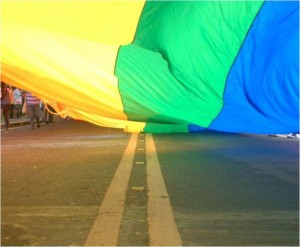“The mass of steel started to crawl away from the train station. The smell of rust was drowned out by a deafening noise that signaled our departure. I reached for the nearest handrail as the ground beneath me started to move. The whole cabin swayed to a rhythm that was random and measured at the same time. In between sobs, my heartbeat tried to catch up with this rhythm but it soon took its own cadence. I was three or four years old. It was a few years before the people power revolution. But all I cared about was where my mother was. And the man seated next to me, who claimed to be my grandfather, had promised that she would be waiting at the next stop.”
—
 This is my earliest memory. I wrote it as part of a writing challenge I accepted for 2013. I have also secretly doubled up this challenge by seeing if I could consistently frame anything I wrote with an LGBT perspective. But my earliest memory does not have anything gay about it, unless I turn it into fiction and “gay it up.” I am, after all, a gay writer. I have also occasionally introduced myself as a gay activist. I am also a freethinker, a photographer, and a teacher. But I have never called myself a gay freethinker, a gay photographer, or a gay teacher.
This is my earliest memory. I wrote it as part of a writing challenge I accepted for 2013. I have also secretly doubled up this challenge by seeing if I could consistently frame anything I wrote with an LGBT perspective. But my earliest memory does not have anything gay about it, unless I turn it into fiction and “gay it up.” I am, after all, a gay writer. I have also occasionally introduced myself as a gay activist. I am also a freethinker, a photographer, and a teacher. But I have never called myself a gay freethinker, a gay photographer, or a gay teacher.
So when is it appropriate to make something or someone ‘gay’ simply by adding the ‘G’ word? If you’re gay and you’re reading this, does it make you a gay reader? And as my partner (who happens to be gay, so perhaps I should say my gay partner) properly posited, should someone self-identify as a transgender in order to be a transactivist? And how about marriage? Why do some people reject the term gay marriage and prefer marriage equality?
Ascribing labels is a basic concept in identity politics and serves multiple functions. Minority groups use labels to claim an identity, or define an experience that would otherwise be assumed to belong to the majority. For example, we do not usually hear someone say “I am a straight statistician” as the heterosexual majority has made us assume that everyone is straight unless they say they are not. But one could be a gay statistician if one so chooses because it is his way of claiming an identity in a field dominated by straight men. Guy Branum, in his article “Yes, Nate Silver, You Are a Gay Statistician,” slams Silver for rejecting the word gay in his title. By dropping the word ‘gay’, Silver is attempting to detach his identity from his experience. It is as if calling himself a gay statistician would require him to use a pink computer and to “gay up” his calculations.
This same hesitation is shared by those who do not embrace the term gay marriage. According to detractors, if we follow this logic, we would have to append the word ‘gay’ to everything that is currently not accessible to gay people. We would have to fight for gay adoption, gay inheritance, gay visitation rights, gay immigration, and so on. It would seem too obvious to point out that the labels matter less than the actual benefits and improvements to our lives.
This is where identity politics comes in conflict with political correctness. Political correctness is a hungry monster that devours unsuspecting words to sustain its relevance. It then spits out neutral labels that have been stripped of their rich history, political conviction, socio-cultural value, and ultimately, their original identity. And that, to me, is a pity.
Don’t get me wrong, I acknowledge that political correctness has its place in social discourse. In fact, for the sake of interpersonal relationships and political harmony, I will continue to use marriage equality and whatever other permutations. However, I will keep calling myself a gay writer. If I wear a rainbow shirt and use a fluffy pen when writing about gay characters, it would be of little to no consequence. What matters is that I am a passionate writer who also happens to be proud of his sexual orientation. And if I become successful, I would prefer to be remembered as a successful gay writer and not simply a successful writer. Perhaps, when the time comes, I would figure out how I can be a gay freethinker, a gay photographer, or a gay teacher. For now, I am happy being a gay writer.
—
“The train behind me sped away taking with it all worries I had. In place of my mother, there he stood, the boy of my dreams.”

